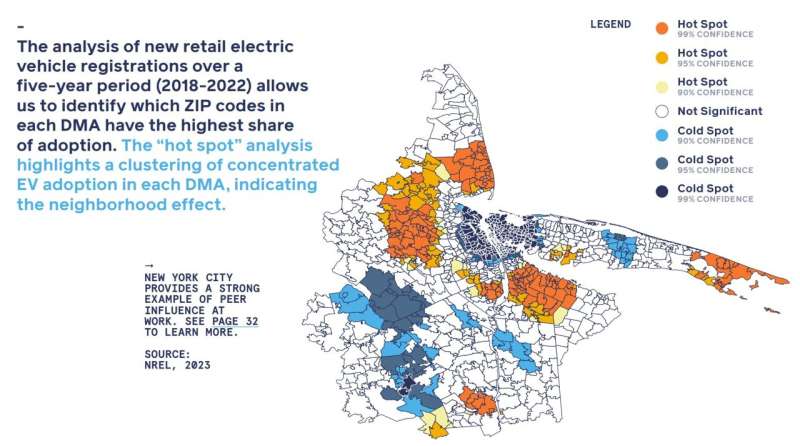
A new report from Generation180, a national, clean energy nonprofit, finds that car buyers are more likely to consider an electric vehicle if their neighbors drive one. While multiple factors can influence purchasing decisions, this analysis of new EV retail registrations over a five-year period finds that EV ownership is highly concentrated in key hotspots—indicating the influence of a “neighborhood effect” on EV adoption.
In the report, Peer Influence and Electric Vehicle Adoption, researchers performed geospatial analysis to determine EV registration “hot spots” for 2018 and 2022, for a 5-year look. The maps in the report demonstrate the presence of a “hot spot” (zip codes with high concentrations of EV registrations per capita), whereas a “cold spot” indicates regions with low EV registration clusters.
However, even in areas with below-average growth, researchers found concentrations indicating a neighborhood effect. EV retail registration data was provided by, and analysis performed using data and insight commissioned from S&P Global Mobility.
“This new report shows how an individual’s personal influence really matters when it comes to encouraging clean energy behaviors like driving electric. And the collective actions of individuals can add up to make a big impact,” said Stuart Gardner, Program Director, Electrify Your Life, Generation180.
This report represents the first time that this type of cluster analysis has been conducted broadly across key U.S. markets to identify zip codes experiencing high EV registration per capita, while accounting for the neighborhood effect.
During the study period (2018-2022), this report shows that:
- Analyses of new retail vehicle registrations in 11 cities, or “designated market areas” (DMAs) studied, indicate strong evidence of a peer effect influence on the growth in EV sales.
- EV registrations experienced significant growth across all 11 DMAs studied.
- Compared to the national average growth (328%), the following cities saw:
- Above national average growth: Miami (571%), New York City (479%), Charlotte (476%), Philadelphia (426%), Austin (377%), Los Angeles (357%)
- Below national average growth: Washington, DC: (319%), Raleigh-Durham (316%), Atlanta (295%), Denver (253%), Seattle (226%).
- Interviews with EV owners, highlighted in ten case studies, illustrate the peer effect qualitatively, including stories about the benefits of driving electric shared by commuters, parents, urban and suburban drivers, and others.
While other factors, such as income, education, age, and product availability, can influence whether someone buys an EV, researchers say, these concentrations of high EV registrations in zip codes point to a neighborhood effect as a significant factor.
“A growing body of evidence finds that if your neighbors adopt clean energy behaviors, you will too,” said Kenneth Gillingham, Professor of Economics, Yale University. “This report is the latest to point to the role of a contagion effect of the good kind. Unlike a pandemic, this contagion can lead peers and neighbors to influence each other to adopt greener technologies.”
“There is unprecedented momentum for clean energy right now in our country,” said Wendy Philleo, Executive Director, Generation180. “As we find ourselves in the ‘decisive decade’ for climate action and emissions reduction, tapping the power of peer influence should be considered more widely as a strategy for helping us achieve a clean energy future for all.”
As governments, EV advocates, and the auto industry look to promote the uptake of electric vehicles, in part to support reductions in carbon emissions, this report provides an important benchmark. With millions of financial incentives available over the coming decade through the U.S. Inflation Reduction Act, the country must ensure that all Americans are able to benefit from EV adoption.
More information:
Report: generation180.org/resource/you … ic-vehicle-adoption/
Provided by
Generation180
Citation:
Report: Car buyers are more likely to consider an electric vehicle if their neighbors drive one (2023, October 26)
retrieved 27 October 2023
from https://techxplore.com/news/2023-10-car-buyers-electric-vehicle-neighbors.html
This document is subject to copyright. Apart from any fair dealing for the purpose of private study or research, no
part may be reproduced without the written permission. The content is provided for information purposes only.
Stay connected with us on social media platform for instant update click here to join our Twitter, & Facebook
We are now on Telegram. Click here to join our channel (@TechiUpdate) and stay updated with the latest Technology headlines.
For all the latest Technology News Click Here
For the latest news and updates, follow us on Google News.
